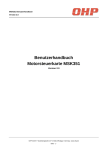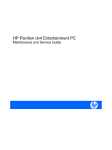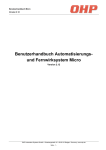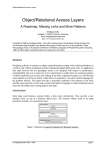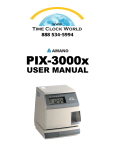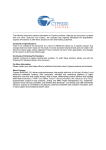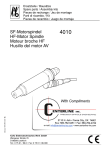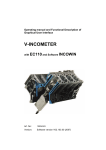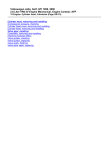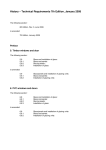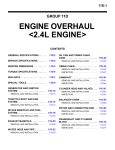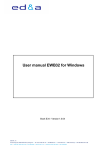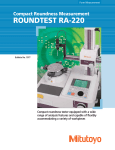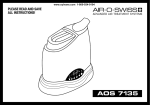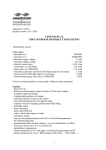Download Replace
Transcript
Gleitlager Titel/ok4 05.12.2000 15:04 Uhr Seite 1 Miba Gleitlager AG Einbauund AustauschRichtlinien Ultimate Performance and Durability Gleitlager engl/ok4 28.12.2000 12:09 Uhr Seite 1 Foreword The following installation and/or replacement guidelines serve on the one hand for the installation of journal bearings and on the other hand as an aid for the evaluation and assessment of bearings that have been in service. Due to the multitude of conditions and applications to which bearings are subjected, we must limit our presentation of installation/exchange guidelines and concentrate on the most frequently occurring situations, thereby neglecting special cases. Nonetheless, we have striven to cover as broad as possible a range for the areas of aluminum bimetal bearings, trimetal bearings, and Rillenlager. Through practical instructions and recommendations, this handbook affords decision support for the service technician. Gleitlager engl/ok4 28.12.2000 12:09 Uhr Seite 2 Gleitlager engl/ok4 28.12.2000 12:09 Uhr Seite 3 Installation and Replacement criteria Contents 1. Guidelines for bearing installation 5 2. Replacement criteria for bimetal bearings 15 3. Replacement criteria for trimetal bearings 27 4. Replacement criteria for Rillenlager 37 Gleitlager engl/ok4 28.12.2000 12:09 Uhr Seite 4 Gleitlager engl/ok4 28.12.2000 12:09 Uhr Seite 5 1. Guidelines for bearing installation Before installation of engine bearings, the following criteria must be met: ■ Correct housing bore with respect to: dimension, roundness, cylindricity, surface roughness. ■ Correct pin with respect to: dimension, roundness, cylindricity, surface condition (cracks), rounded edges of oil hole, waviness, surface roughness. ■ Alignment of housing bore ■ Parallelism of conrod bores ■ Thorough cleaning of engine components: Note: Dirt causes 80 % of all bearing failures! It is not sufficient to clean only the drive train components and the engine outside. The filter housing, the oil pump, the oil pump screen, the oil pan and the oil supply channels in the engine block require thorough cleaning too. This can be done with special cleaning equipment or manually. The latter requires extreme care. New bearings are usually covered with a protective oil or grease layer. Before such bearings are actually installed, they should be dipped into clean petroleum ether or terpentine. Then the protection is to be removed with a soft brush. (Do not wipe the running surface!) Note: The bearing is a precision part and has to be handled accordingly. 5 Bearing installation Prerequisites Gleitlager engl/ok4 28.12.2000 12:09 Uhr Seite 6 Marking the engine parts Mark matching engine parts (connecting rod and cap, main bearing cap, bearing shells). Cleaning the engine parts Dirt causes most bearing failures; therefore, be particularly careful when cleaning the engine parts. When cleaning manually, make sure that the solvent and the cleaning instrument are clean. Be particularly careful with all parts in the oil circuit (oil pump with housing, screen and filter, oil pan, oil cooler, etc.) and canals in the engine block and the crankshaft. 6 Gleitlager engl/ok4 28.12.2000 12:09 Uhr Seite 7 Checking and repairing the parts Check the housing bore using an ID measuring instrument for dimension, roundness and cylindricity. The surface Bearing installation should be checked for damage. Use a micrometer to check the crank pins for dimension, roundness and cylindricity. The surface of the pin and the fillet radii are to be checked for cracks, waviness, hardness and roughness. Check and, if necessary, refinish the oil hole blending of the crankshaft pin. 7 Gleitlager engl/ok4 28.12.2000 12:09 Uhr Seite 8 Using a suitable test instrument to check the connecting rod for bend and // twist. Replacement of bearings The Miba Engine Bearing Catalog helps you to choose the correct replacement bearings. The available undersizes are also given here. Compare the old bearings with the new ones to confirm the correct bearing selection. 8 Gleitlager engl/ok4 28.12.2000 12:09 Uhr Seite 9 Remove the conservation layer from the new bearings. Note: The bearing is a precision part and has to be handled Bearing installation Locating lugs, pins, etc. only serve to set the bearing into the correct position during assembly. They do not contribute to the interference fit. In the event of inadequate friction from the interference fit between bearing back and housing, these positioning devices are usually deformed or destroyed. Free spread is the amount the bearing shell is bigger than the housing bore when measured over the mating surfaces. lt is not to be confused with crush height or preload. The free spread serves to facilitate bearing installation by preventing the shell from moving and falling out. A bearing with no or negative free spread must not be installed because the danger of a contact between the shaft and the running surface near the mating faces is high. This can lead to bearing failure. 9 Bearing installation accordingly. Gleitlager engl/ok4 28.12.2000 12:09 Uhr Seite 10 A C 20° 20° B Bearing clearance and its measurement Correct bearing clearance is mandatory for proper functioning of the bearing. The correct data are given in the user's manual for the respective engine. Checking the bearing clearance is recommended after engine repair or reconditioning. Correct bolt tightening prior to measurement is mandatory. The two most feasible methods for measuring bearing clearance of radial bearings are: a) Measure the pin diameter (using a micrometer) and bore diameter after bearing installation (using a precision bore gauge). Afterwards subtract the pin diameter from the bearing bore diameter. b) A quicker and easier method is to use a Plastigage. The Plastigage is a special thin, soft strip which is inserted into the clearance between pin and bearing. The Plastigage strip widens due to compression when the bolts are tightened. The final width is an indication of the clearance, which can be read directly from a scale on the package. The strip must always be inserted at a point where the pin does not contact the bearing. This method only indicates a rough measure of the clearance and is not as exact as the other method. In addition, the roundness and the displacement of the cap can be checked: Roundness: Compute the average of measurements A and B and compare with measurement C. Cap displacement: If there is a difference between values A and B, indicates the cap displacement of half the difference. 10 Bolt tightening and inspection of bearing cap preload Several possibilities exist to tighten the cap bolts. The correct method for a given application and the prescribed data can be found in the respective engine manual. In many cases the engine manufacturer prescribes replacement of bolts for reassembly. In case of doubt, the use of new bolts is recommended. Proper interference fit of a bearing can be inspected by measuring the gap between the mating faces of cap and housing. This measure represents approximately the difference between the bearing shell circumference and the bore circumference. Standard values either can be found in the engine manual or have to be established from experience. The basic measurement procedure is carried out as follows: ■ Install bearing and tighten bolts as prescribed. ■ Open the bolts on one or both sides, depending on the measuring method. ■ Measure the resulting gap along the bearing back between the cap and the housing and between the cap and the conrod. The accuracy of this method depends on retaining good contact between bearing back and housing even with the bolts loosened on one side. 11 Bearing installation Gleitlager engl/ok4 28.12.2000 12:09 Uhr Seite 11 Gleitlager engl/ok4 28.12.2000 12:09 Uhr Seite 12 Installation of crankshaft In order to avoid impairments of the bearing when starting in a dry state, lubricate the running surfaces with clean oil. Insert the crankshaft and tighten the bolts in the main bearing caps as specified. Make sure the parts are correctly matched. Check whether the crankshaft turns easily and smoothly. Check the lateral movement of the crankshaft using a dial gauge or feeler gauge (axial clearance). 12 Gleitlager engl/ok4 28.12.2000 12:09 Uhr Seite 13 Assembling the connecting rod caps Before assembly, lubricate the bearing running surface sufficiently with oil, and make sure the parts are properly matched. Tighten the bolts as specified. Check the axial clearance using feeler bility of the connecting rod. Oil circuit pressurizing procedure After repair work or reconditioning, it is of utmost importance that a dry engine be completely filled with oil before starting it. When the oil passages are not filled and the bearing surfaces are not lubricated, the latter may be damaged because it takes a relatively long time until oil from the sump reaches the bearings. Such damage does not necessarily lead to immediate bearing failure; however, it impairs the load carrying capability and most likely reduces bearing life. Pressurizing an engine has the following advantages: 1. All components are lubricated prior to starting and a hydrodynamic oil film builds up in the bearing after only a few revolutions. Early damage to the running layer is thus avoided. 2. It is immediately possible to diagnose oil loss due to excessive clearances, leaks in the engine housing, or missing covers in the crank shaft channels. The oil pan has to be removed, of course. Procedure: At least 30 % of the total oil contents are pressed from the pressurizing vessel into the engine. The pressure should correspond closely to the prescribed oil pressure level of the engine in operation and must not exceed it. If an engine is not equipped by design with a connection for the pressurizing equipment, this can be improvised via the end plug of the main oil gallery. 13 Bearing installation gauge as well as the easy axial mova- Gleitlager engl/ok4 28.12.2000 12:09 Uhr Seite 14 Gleitlager engl/ok4 28.12.2000 12:09 Uhr Seite 15 2. Replacement criteria for bimetal bearings ■ High-speed, medium-speed and low-speed engines ■ Gasoline, diesel, gas, HFO engines ■ Conrod large end bearings ■ Main bearings ■ Camshaft bearings ■ Thrust washers Spec. unit load [N\mm2] Load limits MIBA MIBA MIBA MIBA MIBA MIBA MIBA MIBA MIBA 100 80 60 34, 57, 33 24, 18, 15, 53 14 52 36, 37 58 26, 51 19 03, 04, 13, 16 40 20 0 100 200 300 400 500 600 700 800 Diameter [mm] Advantages of bimetal bearings ■ Low wear rate ■ High corrosion resistance ■ Economical price 15 Bimetal bearings Range of application Gleitlager engl/ok4 28.12.2000 12:09 Uhr Seite 16 Material composition Miba 15 AlSn25 lining material (AlSn+) strengthened matrix high-strength bonding foil steel back Miba 53 AlSn20 lining material (BIAL) AlZn4,5 lining material steel back Miba 14 AlSn20 lining material (AlSn20) Al bonding foil steel back Miba 52 AlSn40 lining material (AlSn40) Al bonding foil steel back 16 Gleitlager engl/ok4 28.12.2000 12:09 Uhr Seite 17 New Condition Without flash With flash Dull, light gray running layer. Lines along side faces are traces caused by wall thickness checking. Have no influence on bearing performance. 17 Bimetal bearings The running surface has a silvery, bright color. Gleitlager engl/ok4 28.12.2000 12:09 Uhr Seite 18 Bearing surface Standard Miba bimetal bearings have no tin flash. Oil is used for protective coating. In new condition the bearing has a silvery, bright color. The running surface might become dull silvery after only a short time of operation. On customer request the Miba bimetal bearing can be made with tin flash. Criteria for bimetal bearing replacement Visual evaluation of the wear, as done with trimetal bearings, is not possible for bimetal bearings. Actual wear can be determined by measuring wall thickness or via clearance measurements in comparison to the specification for a bearing in new condition. A bearing should be replaced if the wear limit, as specified by the engine manufacturer, is reached or can be expected to be reached during the next period of operation. Another method is to specify a certain time limit for the useful service life of the bearing. The individual time limit (recommended maximum time in operation) specified by the engine manufacturer is based on the calculated bearing load, minimum oil film thickness and load profile. The useful service life of a bearing is also determined by the fatigue strength of the lining material under the respective load profile. 18 Gleitlager engl/ok4 28.12.2000 12:09 Uhr Seite 19 Usual running pattern Typical running pattern after completion of running-in: Without flash Slightly polished zones and symmetrical running pattern in the most loaded Reusable With flash In the most loaded zone of the bearing, slightly polished zones, partly removed ▼ flash and asymmetrical running pattern are visible. Minor scoring. Reusable 19 Bimetal bearings ▼ zone of the bearing. Minor scoring. Gleitlager engl/ok4 28.12.2000 12:09 Uhr Seite 20 Minor edge loading and usual running pattern. ▼ Slightly polished stripes along the side faces. Reusable Localized heavy smearing of lining material ▼ due to local disturbance of the oil film. Replace 20 Gleitlager engl/ok4 28.12.2000 12:09 Uhr Seite 21 More extensive area of damage with seizure Locally smeared lining material Replace BIAL bearing Localized separation of AlSn20 and AlZn4,5 lining due to overstressing (thermal influences combined with excessive shear forces). 21 Bimetal bearings ▼ caused by a severe disturbance of the oil film. Gleitlager engl/ok4 28.12.2000 12:09 Uhr Seite 22 Localized separation of AlSn20 and AlZn4,5 Cross section: Cracks and material removal in the AlSn20 material. ▼ Beginning of separation of AlSn20 from AlZn4,5. Replace Damage due to foreign particles ▼ Shallow scoring and / or imprints that are few in number. Reusable 22 Gleitlager engl/ok4 28.12.2000 12:09 Uhr Seite 23 Damage due to foreign particles Many scores or multiple deep grooves and/or imprints. Fig. 1: Deep scoring, imprints. Bimetal bearings ▼ Lining material locally smeared. Replace ▼ Fig. 2: Many deep imprints. Replace 23 Gleitlager engl/ok4 28.12.2000 12:09 Uhr Seite 24 Minor cavitation after long time in operation ▼ Minor and shallow material removal outside the most loaded zone. Reusable Deep punctual cavitation In severe cases the cavitation extends to the steel shell, spreads along the inter- ▼ face between steel shell and lining material, and undermines the AlSn20 lining. Replace 24 Gleitlager engl/ok4 28.12.2000 12:10 Uhr Seite 25 Deep cavitation Cross section: Local material removal from the steel shell. ▼ Beginning of undermining of the lining material. Replace 25 Bimetal bearings Cavitation at the end of the oil groove. Gleitlager engl/ok4 28.12.2000 12:10 Uhr Seite 26 Fatigue rupture of the lining material Mechanism: – Development of fine cracks in the lining material – Network of cracks (crazing) – Parts of the lining material break out Cross section: Zone showing missing lining material. Crack development in the Al bonding foil and lining material. ▼ Remainder of Al bonding foil on the steel with good bond. Replace 26 Gleitlager engl/ok4 28.12.2000 12:10 Uhr Seite 27 3. Replacement criteria for trimetal bearings Range of application ■ High-speed, medium-speed and low-speed engines ■ Compressors, Gears ■ Gasoline, diesel, gas, HFO engines ■ Conrod large end bearings ■ Main bearings ■ Thrust bearings ■ Camshaft bearings ■ Gear bearings MIBA MIBA MIBA MIBA MIBA MIBA MIBA MIBA MIBA 100 80 60 34, 57, 33 24, 18, 03, 53 14 52 36, 37 58 26, 51 19 04, 13, 16, 15 40 20 0 100 200 300 400 500 600 700 800 Diameter [mm] Advantages of trimetal bearings ■ Good adaptability ■ Low seizure tendency 27 Trimetal bearings Spec. unit load [N\mm2] Load limits Gleitlager engl/ok4 28.12.2000 12:10 Uhr Seite 28 Material composition Flash PbSn18Cu2 overlay Miba 04 Miba 04 and 16 Miba 16 PbSn10TiO2 overlay Miba 18 Miba 18 Ni intermediate layer Aluminum alloy Flash PbSn18Cu2 overlay Miba 03 Miba 03 and 13 Miba 13 PbSn10TiO2 overlay Miba 19 Miba 19 Ni intermediate layer Lead bronze alloy General guidelines The following examples should help in evaluating the condition of used bearing shells. For all pictured bearings, the crankshaft was still faultless. The running times leading up to the removal of the bearings varied. The running time leading up to the development of the manifestations shown in the pictures is influenced by the following factors: ■ Operating conditions ■ Maintenance (e.g., lubrication) ■ Correct assembly 28 Gleitlager engl/ok4 28.12.2000 12:10 Uhr Seite 29 1. Operating Conditions Depending on the intended application, performance limits are prescribed and the engines accordingly adapted by the engine manufacturer. Exceeding these limits (e.g., through overloading, excessive speed of rotation, excessive oil temperature, etc.) decreases bearing life and in extreme cases causes bearing damage. 2. Maintenance For faultless operation and attainment of the prescribed life expectancy, the engine manufacturer prescribes exact maintenance instructions. Opening the bearing shell without a specific reason is not advisable. 2.1. Lubricating oil ■ Use of oil of the quality and viscosity class prescribed by the engine manufacturer ■ Inspection and change of oil at prescribed intervals ■ Change of filter and maintenance of oil cleaning equipment ■ Use of oil cleaning equipment ■ No manipulation of the filter for any reason ■ Control of the water and fuel content of the oil through ■ Appropriate cleanliness of the environment during oil changes 2.2. Fuel ■ Use of fuel and fuel filters of prescribed and approved quality 29 Trimetal bearings analyses Gleitlager engl/ok4 28.12.2000 12:10 Uhr Seite 30 Criteria for trimetal bearing replacement The bearings should be removed according to the sequence of steps and methods prescribed by the engine manufacturer. Cleanliness is of utmost importance during this procedure. The bearing shell should be removed only when prescribed by the engine manufacturer or when conclusively necessary (bearing damage). Opening the bearing without a specific reason is not advisable, because whenever the bearing is removed; new running-in procedures must follow. When bearing shells are removed, they generally reveal one of the wear conditions shown in the pictures. The condition of wear is judged essentially according to the visible portions of the overlay, nickel intermediate layer and bearing alloy layer. It is relatively easy to distinguish between the tin flash (bright silvery layer) and the running surface (light to dark gray with possible black spots* . The nickel intermediate layer appears as a light yellowish color, the aluminum layer is flat silver and the CuPb layer is bronze colored. If there is any doubt whether the running surface is worn through to the nickel intermediate layer (due to coloration from oil coke, etc.), a light scrape test is recommended. This should be carried out with light pressure from a dull triangular scraper or a pocket knife. It is easy to distinguish between the much softer running surface and the harder nickel intermediate layer without damaging the bearing. * see footnote page 36 30 Gleitlager engl/ok4 28.12.2000 12:10 Uhr Seite 31 Wear of the running surface results from mixed friction during operation, e.g., during every start procedure, from introduction of foreign particles, from corrosion, and from too little lubrication oil. Actual operation has shown that, after running in, the bearing functions without any problem on the running surface and, after wear, on the nickel intermediate layer and the bearing alloy. However, the risk of failure (e.g., due to the introduction of dirt, a lack of oil, overloading, etc.) increases when the pin runs on the nickel intermediate layer. When evaluating bearing shells, one should keep in mind that in case of doubt, replacing a bearing costs considerably less than pos- Trimetal bearings sible damage to the crankshaft would. 31 Gleitlager engl/ok4 28.12.2000 12:10 Uhr Seite 32 Usual running pattern Bearing shell has light running tra- Bearing shell has worn running sur- ces. Sn flash is not worn through. face on one side. Sn flash is worn ▼ through in this area. Reusable 32 Gleitlager engl/ok4 28.12.2000 12:10 Uhr Seite 33 Running layer is worn on one side; Trimetal bearings dark surface: corrosion. Light running traces in running layer. Corrosion protection is present only in ▼ the area of the relief. Reusable 33 Gleitlager engl/ok4 28.12.2000 12:10 Uhr Seite 34 Risky condition Bearing shell shows dirt scratches in The running surface is worn through the running surface and black spots* to the Ni intermediate layer in the on the running surface, but the over- indicated region and has black lay is still in good condition. spots* on the running surface and dirt scratches in the running surface. Evaluation: The bearing shell can be reused if the scratches are not too Evaluation: The bearing must stay in deep (i.e., if they do not cut into the the housing (cover); only then it can bearing alloy) and if they are not too be re-used. A removed bearing shell numerous. The pictured shell can be cannot be reinstalled. reused. ▼ * Reuse restricted 34 see footnote page 36 Gleitlager engl/ok4 28.12.2000 12:10 Uhr Seite 35 Borderline case Running surface worn through to Ni intermediate layer on both sides. Black spots * on running surface. Trimetal bearings Running traces with light dirt scratches. Evaluation: If the worn zone is narrower than 1/3 of the running surface width, the bearing is reusable, provided that the bearing is not removed from the housing. If the worn zone is * wider than 1/3 of the running surface width, the bearing must be replaced. ▼ In case of doubt, replace the bearing. Reuse restricted 35 see footnote page 36 Gleitlager engl/ok4 28.12.2000 12:10 Uhr Seite 36 Replacement necessary Aluminum Ni intermediate layer Running layer The running surface is worn through Black spots* appear on running sur- to the Ni intermediate layer over a face. The light yellowish zone is the large area. Corrosion of the overlay Ni inter-mediate layer. For aluminum is evident in dark places. Large bearings, in the gray zone the Ni foreign particles are embedded in intermediate layer is worn through the running surface. and the aluminum alloy is visible. For lead-bronze bearings the bronzecolored bearing material is visible in the worn area. * Causes of black spots on the ■ ■ ■ ▼ ■ Replace 36 running surface: Worn through Sn flash Sn depletion due to diffusion Running surface corrosion Oil coke embedding Gleitlager engl/ok4 28.12.2000 12:10 Uhr Seite 37 4. Replacement criteria for Rillenlager Range of application ■ High-speed, medium-speed and low-speed engines ■ Gasoline, diesel, gas, HFO engines ■ Conrod large end bearings ■ Main bearings ■ Thrust washers MIBA MIBA MIBA MIBA MIBA MIBA MIBA MIBA MIBA 100 80 60 34, 57, 33 24, 18, 03, 53 14 52 36, 37 58 26, 51 19 04, 13, 15, 16 40 20 0 100 200 300 400 500 600 700 800 Diameter [mm] 37 Rillenlager Spec. unit load [N\mm2] Load limits Gleitlager engl/ok4 28.12.2000 12:10 Uhr Seite 38 Material composition PbSn18Cu2 overlay Miba 24 Ni intermediate layer AlSn6 bearing alloy PbSn18Cu2 overlay Ni intermediate layer Miba 26 AlZn4 bearing alloy Flash PbSn18Cu2 overlay Miba 51 Miba 51 PbSn10TiO2 overlay Miba 33 Miba 33 Ni intermediate layer CuPb22Sn bearing alloy 38 Gleitlager engl/ok4 28.12.2000 12:10 Uhr Seite 39 Advantages of the Miba-Rillenlager ■ Low wear rate, even with thin lubrication film and high loads. ■ Low susceptibility to failure, even when there are impurities in the lubricating oil. ■ Due to the grooved structure there is no continuous nickel layer right, thus reducing the risk of failure. ■ Greater corrosion resistance than normal trimetal bearings. ■ Depending on the degree of wear, it is possible to re-install used bearings. ■ No increase in pin wear rate. ■ Equally suitable for use with hardened or unhardened pins. Damage to the bearing We will not deal here with bearing damage that requires premature replacement due to irregular operating conditions. Such damage usually results from such causes as: ■ Foreign particles scoring, indenting or becoming embedded in the bearing ■ Cavitation ■ Corrosion ■ Scoring for various different reasons (e.g., insufficient oil) ■ Fatigue (caused by overloading) ■ Incorrect assembly. In these cases, not only must the bearings be replaced, but the 39 Rillenlager cause of the damage must be identified and eliminated. Gleitlager engl/ok4 28.12.2000 12:10 Uhr Seite 40 Criteria for replacement of the Rillenlager The running surface of new bearings consists of approx. 75% electroplated overlay and approx. 25% bearing alloy ridges. Overlay (˜ 75 %) Bearing alloy (˜ 25 %) Ni intermediate layer (max. 5 %) The first signs of running surface wear appear on the electroplated running layer. The overlay in the groove is worn down by a few 0.001 mm. As wear increases, the difference between the alloy ridges and the overlay remains more or less the same, at approx. 0.005 mm. For precise evaluation of the degree of wear of the running surface, a magnifying glass (minimum magnification 5x) is necessary. With steel/light-metal Rillenlager, the running layer is recognizable as a dark zone and the light metal ridges as light zones. In new condition, the steel/lead-bronze Rillenlager has a dull, light gray running surface and can hardly be distinguished optically from a trimetal bearing. After the flash is worn off, the running layer has a dark gray and the bearing material a bronze appearance. 40 Gleitlager engl/ok4 28.12.2000 12:10 Uhr Seite 41 The ratio of the bearing alloy ridge width to the groove width, as well as the size of the worn surface, are the most important criteria for evaluating the degree of wear of the Rillenlager. The Rillenlager can still function when the overlay in the grooves has partly worn away. In actual practice it has been proven that the Rillenlager can continue to function without any ill effects, even with partially empty grooves. For every assessment of the condition of the ridges for steel/light-metal Rillenlager, the benchmark should be the running surface in a less loaded area (generally the ridge condition of a new bearing). For steel/lead-bronze Rillenlager, the benchmark should be a transition area where the flash has just been worn through 41 Rillenlager and the ridge structure is visible. Gleitlager engl/ok4 28.12.2000 12:10 Uhr Seite 42 Usual running pattern The geometry of the groove is as new. The overlay inside the groove is fully intact. The dark spots are predominantly embedded oil coke particles. ▼ The ratio between the bearing alloy ridges and the overlay is 25 % to 75 %. Reusable The overlay in the grooves has worn through uniformly by about 0.005 mm. The bearing alloy ridges show no sign of wear. The dark spots are predominantly embedded oil coke particles. ▼ As a result of overlay wear, the bearing alloy ridges appear slightly wider. Reusable 42 Gleitlager engl/ok4 28.12.2000 12:10 Uhr Seite 43 Usual running pattern Small foreign particles are spread over the entire running surface. No significant ▼ alteration of the bearing alloy ridges is evident. Reusable The overlay has been locally displaced and smeared over the bearing alloy Reusable 43 Rillenlager ▼ ridges. The bearing alloy ridges can no longer be seen in some places. Gleitlager engl/ok4 28.12.2000 12:10 Uhr Seite 44 Wear In some places the bearing has been worn down to such an extent that the bearing alloy ridges and the overlay grooves have reached a ratio of 1:1. The width of the aluminum ridges has increased from 25 % (when new) to 50 %. Some overlay still exists in the grooves. Running layer – groove Bearing material – ridge ▼ = Wear 1:1 Reusable of circumference/shell max. 35 % of width max. 50 % of circumference/shell max. 30 % max. 70 % of width The bearing is functional. If a wear condition as depicted in „Borderline case – wear and local leveling of the ridges“ (see next page) is anticipated within the next service interval, then the bearing should be replaced for safety reasons. 44 Gleitlager engl/ok4 28.12.2000 12:10 Uhr Seite 45 Borderline case – wear and local leveling of the ridges The bearing material ridges are worn locally. When the level of wear as defined above is reached, the bearing needs to be replaced. = Bearing material ridges worn Replace max. 10 % of width Rillenlager 45 strip-shaped wear of circumference/shell of circumference/shell max. 10 % of width max. 5 % max. 20 % of width max. 35 % ▼ = Wear 1:1 Gleitlager engl/ok4 28.12.2000 12:10 Uhr Seite 46 Cracks in the running layer Fatigue of the electroplated overlay due to local overload. The bearing is functional. ▼ = Cracks in the running layer Reusable of circumference/shell max. 35 % of width max. 50 % of circumference/shell max. 25 % max. 70 % of width If a condition as depicted in „Borderline case – cracks in the overlay, empty grooves“ (see next page) is anticipated within the next service interval, then the bearing should be replaced for safety reasons. 46 Gleitlager engl/ok4 28.12.2000 12:10 Uhr Seite 47 Borderline case – cracks in the overlay, empty grooves Empty grooves. Empty grooves are visible due to a washing out of the broken running layer. Local wear of the bearing material ridges might be visible. When a condition as defined above is reached, the bearing needs to be replaced. = Cracks in the running layer = Empty grooves Replace max. 15 % of width Rillenlager 47 of circumference/shell of circumference/shell max. 30 % of width max. 10 % max. 40 % of width max. 40 % ▼ = Bearing materials ridges worn Gleitlager engl/ok4 28.12.2000 12:10 Uhr Seite 48 Notes Gleitlager Titel/ok4 05.12.2000 15:04 Uhr Seite 2 Austria Bearing Group / Headquarters: Miba Gleitlager AG Dr. Mitterbauer Strasse 3 A-4663 Laakirchen Tel.: +43/7613/2541 Fax: +43/7613/2095 e-mail: [email protected] http://www.miba-at.com


















































